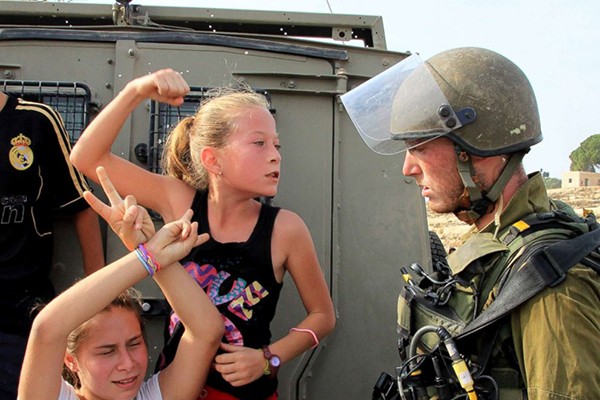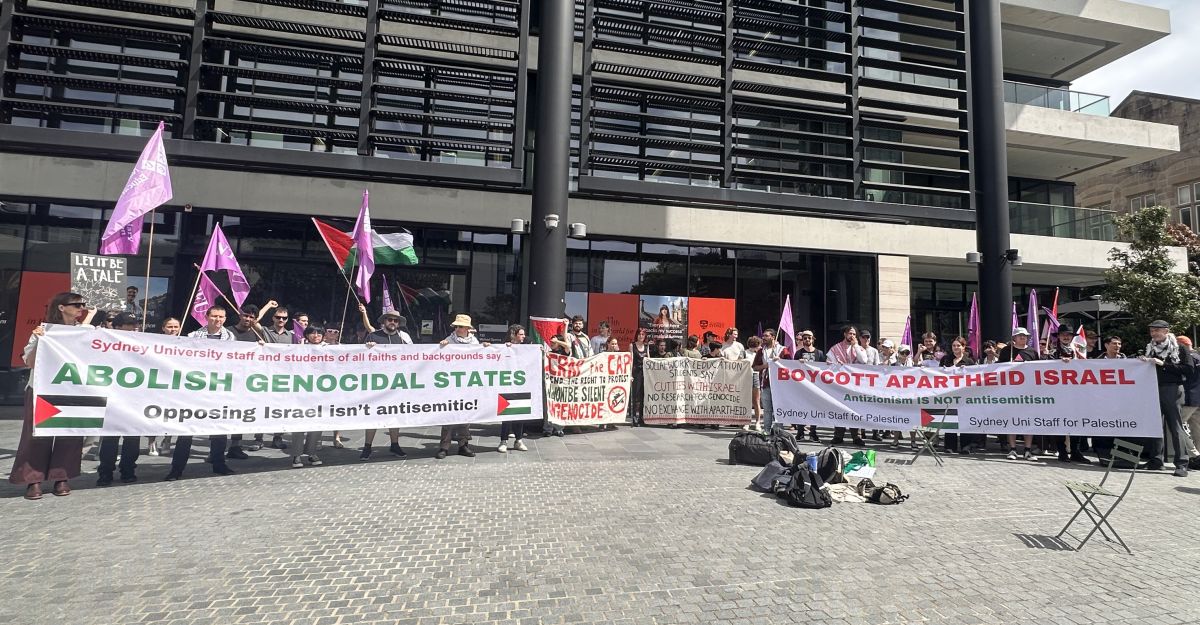The December arrest and detention of Ahed Tamimi, a sixteen-year-old Palestinian girl from the West Bank village of Nabi Saleh, raises a series of ethical questions for Australians. Her youth suggests first of these, and the filters through which Tamimi as an embodied subject is represented in Western media the second. Both issues sit in the context of a broader question about the stance liberal democracies will take in instances of egregious and well publicised breaches of rights. And this question is particularly troubled by the emotional dimension of Western states like Australia and their ancillary affiliation to Israel. In the case of Australia, it is additionally troubled by the problematic of its affiliation with Israel, as states with shared histories.
I am not, of course, referring to such events as the bizarre centennial commemoration of the ANZAC-led Battle of Beersheba, celebrated in February 2017, which overlooked the awkward fact that Israel was still some thirty-one years from its inception, or the even more awkward fact that it was Palestinians who fought with the ANZACS (and who were later slaughtered by them at Sarafand in 1918). But rather, to the shared settler-colonial histories of these two states which makes their democratic scope selective at best, and otherwise perpetrators of unconscionable silences and the bloodiest of violence.
In recent years, the scale of Israeli military assaults in the Gaza strip alone, most significantly in Operations Defensive Shield (2008-9), Pillar of Smoke (2012) & Protective Edge (2014), has raised a range of uncomfortable facts about Israel-Palestinian relations. Such events highlight for example the insufficiency of a term such as conflict, where on the one hand there is a captive civilian population, precluded from escape and vulnerable to attack, and on the other a military power with an acumen for technologies of war which now constitute one of that country’s chief exports. To the contrary, although Israel cannot stand to hear it, there is no conflict today between Israel and the Palestinians. Rather, there is an Occupation, which creates, in myriad ways, a two-tiered system of life, depending on a person’s status in (or under) that Occupation.
So where does Ahed Tamimi stand in relation to this preamble? Crucially, she is a Palestinian and a resident of the West Bank. This residence holds some significance, since in the shadow of Israeli democracy lies a legal anomaly. That is: that Palestinian residents of the West Bank are subjected to military law, while the Jewish-settler population of the same geography, who hold Israeli citizenship, enjoy the legal system of Israel ‘proper’ (notwithstanding that Israeli borders have never been finally described). Thus, in encountering the legal system, as a Palestinian West Banker, Ahed Tamimi faces a military court system, put in place at the advent of Israel’s West Bank Occupation in 1967, in which defendants are not accorded access to legal representation, in which the defendant is not privy to the case made against them, and in which the conviction rates are in excess of ninety-nine per cent. As a system administered by a proclaimed democratic state, the mere facts of this process ought to be received as distressing news and recognised as deeply prejudicial to any person who stands accused.
But then, of course, Ahed Tamimi is not just a subject before the law, such as it is, but a child.
There is, in the West, a tendency to reify the innocence of children. Yet this reification is bounded by a series of exclusions in which it is clear that childhood is only a protected realm for a privileged few. I have heard from ex-IDF service people that they were ‘kids’ when they served in the army. The same has been said of Australian servicemen; one need only watch Peter Weir’s Gallipoli to be reminded of the patriotic motif of boyhood and wasted youths that are the cost of war. Yet, the sentimental recognition of psychological minority afforded to youthful servicemen is never afforded actual children of Palestinian ethnicity in Israel, such as Ahed Tamimi, whose claim to rights laid out in international conventions is excluded by definition in the procedures of a military court system.
The question of Ahed’s crime is laughable, if it were not for the machinery of the Israeli system in which sentencing is notoriously disproportionate to the allegations (and which according to the Association for Civil Rights in Israel has proposed the possibility of delivering life sentences for children as young as fourteen). Ahed came to international attention in footage following the arrest of her brother some five years ago. An eleven year old at the time, she is shown admonishing a fully armed Israeli soldier, her fist raised, her voice rageful and unwavering, notwithstanding the disparities of size and power in that encounter. In the recent arrest, a pre-dawn raid of the family home, which is routine Israeli practice in relation to Palestinian suspects, she was apprehended for slapping an Israeli soldier at her family’s property. Nor was this action at random, but rather a response to the IDF shooting her cousin in the face with rubber bullets, from which he sustained life-threatening injuries. Indeed, at the time, no reason was offered to her family to explain the arrest. While the Association for Civil Right in Israel notes the right of Palestinian children detained in the West Bank to a parental visit (a rare and only partial concession to the internationally enshrined rights of the child in such situations), her mother was later arrested at the Israeli police station during such a visit, and similarly remains in custody.
As appalling as the circumstances of Ahed’s arrest are, she represents just the tip of the iceberg. Figures compiled by Defence for Children International Palestine indicate that in 2016, on average, 375 Palestinian children were held in Israeli military detention per month aged between twelve and seventeen (most often for the charge of throwing stones). During these periods of detention, Palestinian children are subjected to physical violence and torture, and generally denied the rights of children in detention enshrined at international law. The documentation of this insists on a conclusion that far from randomied abuse, this treatment must be recognised as institutionalised practice in the Israeli system.
In November 2016, forty-nine Australian politicians signed a petition urging that Israel’s ill-treatment of Palestinian children in detention should end (no signatories, it should be noted, hailing from the Coalition). This was tendered alongside ten parliamentary speeches in which members raised a host of issues related to the subject. While the event was of value as an exercise in awareness raising, the petition, which called for Israeli compliance with the international Convention on the Rights of the Child, overlooked much of the relevant context in which Palestinians are routinely denied their rights under the suffocating fact of Israeli Occupation.
But if Israel’s Occupation is one of the political unmentionables in Australia, so too is our appalling record of Aboriginal deaths in custody and abuse of youths in detention, such that it is clear that neither is Australia’s own house in order. Royal Commissions on Deaths in Custody and Aboriginal Youths in Detention have made little impact on systemic practices of abuse in the Australian carceral, when on 16 January this year, the Guardian reported that Amnesty International has again alleged breaches of international law in Australian youth detention. This is one point of the shared histories of Australia and Israel that is concealed in joint celebrations of ‘young nations with short histories’. The problem of Palestinian or Aboriginal children in custody points also to these states’ joint denials of Indigenous populations that stand as a insidious reminder of the imposition of a settler-state, or the resort to genocidal violence or ethnic cleansing as a means to remove every last body which stand as evidence to the originary colonial crime.
This is what Ahed Tamimi reminds us of when she is shown slapping an IDF soldier or waving a clenched fist in their faces. Most recently, it is clear that Ahed was not attempting to injure the soldiers. But it is not the stones Palestinian children throw or their threats to armed military personnel that motivate arrests. Their arrests are a sign of what Israel will not countenance, of why Israel cannot countenance Ahed Tamimi. These are children who have lived their lives under a violent military Occupation in which Palestinian lives are curtailed in every imaginable way. And the message sent in each small act is that they do not accept it; that they will continue to wrest agency from its oppressive and victimising reign. Thus, the crime of Ahed Tamimi, one that will not be found in any criminal code, is that her actions shame Israel and the IDF.
Notwithstanding the self-referential echo chambers of social media, the case of Ahed Tamimi has received sustained attention in Western media space since her arrest, albeit that of a politically left bent. It seems impossible not to wonder if part of her appeal lies in her supposedly a-typical appearance: fair featured with a distinctive mane of blond hair. Combined with her youth, this seems to have made her a surprising and palatable image of Palestinian activism to a Western audience. Even so, it does not negate the fact that in her actions, Ahed Tamimi draws attention to the brutal reality of Israeli Occupation. Or that her name is now synonymous with its resistance. For her Australian sympathisers, Tamimi’s story ought also to draw attention to the disgraceful undersides of Australia’s domestic and foreign policy; its own shameful record of imprisoning its Indigenous population and subjecting them to death-inducing abuse, as well as its historically and ethically indefensible attitude to Palestinian suffering in the service of maintaining good relations with Israel.
Israel’s is a system that has disappeared Palestinians for decades. It has assassinated Palestine’s intellectuals and political leaders and incarcerated others around whom a coherent set of politics and program of resistance looked sure to form. But increasingly the rogue element of social media has made such vanishing acts much harder for Israel to effect. We cannot know what will happen next to Ahed Tamimi. But the bravery of her resistance and the widespread documentation of her story will safeguard, at the least, the power of her name.
Ahed Tamimi will not be made to disappear.
Image: palestinelibre.org






